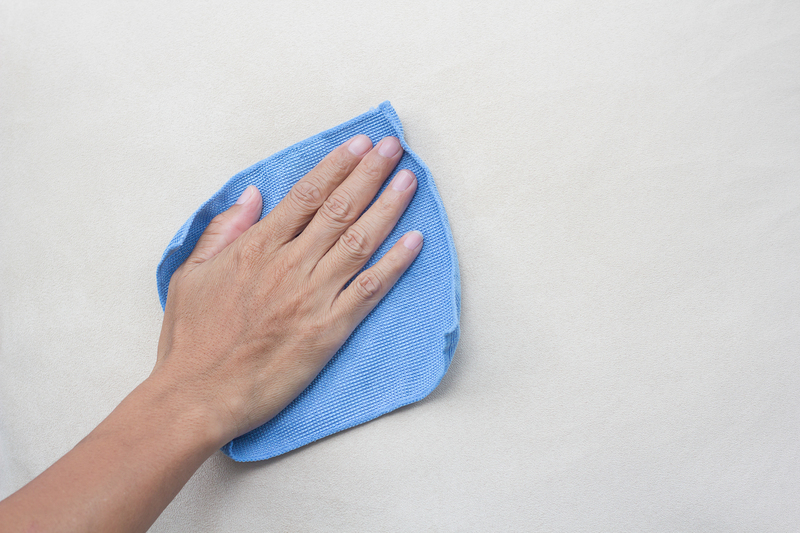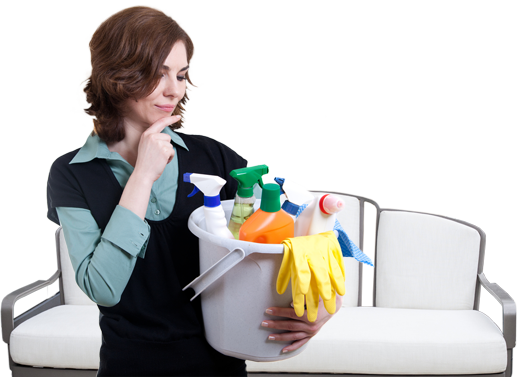Clean Window Sills: No More Mould Hassle
Posted on 05/09/2025
Clean Window Sills: No More Mould Hassle
Are your window sills affected by persistent mould and grime? Don't fret! Keeping your window sills clean and mould-free is essential for a healthy and visually appealing home. In this comprehensive guide, we'll dig into all you need to know about clean window sills and eliminating the mould hassle for good.
Why Is It Important to Clean Window Sills?
Mouldy and dirty window sills do more than harm your home's aesthetic appeal--they can affect your health and the integrity of your windows. Thoroughly understanding their impact will help you stay motivated.
- Health: Mould spores can aggravate allergies, trigger asthma attacks, and cause respiratory issues.
- Damage: Over time, dirt and mould can break down materials, leading to costly repairs or replacements.
- Appearance: Clean window sills enhance the overall look and feel of your home.
Common Causes of Mould on Window Sills
A sparkling, mould-free window sill doesn't just happen by itself. It's valuable to understand what puts your sills at risk:
- Condensation: Frequent window condensation provides the moisture that mould needs to thrive.
- Poor ventilation: Limited airflow keeps areas damp, inviting mould growth.
- Inadequate cleaning: Occasional wipes may not remove deep-seated grime and spores.
- Leaky windows: Faulty seals can let rainwater seep onto the sill, causing persistent dampness.

Essential Tools and Supplies For Cleaning Window Sills
Getting the right cleaning supplies makes the task of cleaning window sills quicker and more effective. Consider gathering:
- Rubber gloves
- Scrub brush or old toothbrush
- Microfibre cloths
- Vacuum cleaner with brush attachment
- Spray bottle for cleaning solutions
- Vinegar or mild detergent
- Baking soda
- Commercial mould remover (optional)
How to Clean Window Sills: Step-by-Step Guide
Ready to restore those window sills to their former glory? Follow this detailed step-by-step protocol for removing dirt and destroying mould:
1. Prepare the Area
- Open the window for ventilation.
- Remove any curtains or blinds to prevent them from getting dirty or wet.
2. Remove Loose Dirt and Debris
- Use a vacuum cleaner with a brush attachment to lift dust, spider webs, and loose dirt from the sill and corners.
- If you don't have a vacuum, a dry microfibre cloth can do the trick.
3. Apply Your Cleaning Solution
- Mix equal parts white vinegar and water for a natural mould-busting spray.
- Alternatively, use a gentle detergent diluted according to instructions.
- Spray your chosen solution liberally onto the window sill, paying special attention to mouldy patches.
4. Scrub Away the Mould and Grime
- Allow the solution to sit for several minutes to break down the mould and dirt.
- Gently scrub with a brush or toothbrush, focusing on corners and hard-to-reach crevices.
5. Rinse and Wipe
- Wipe away dissolved mould and dirt with a clean, damp microfibre cloth.
- For stubborn stains, sprinkle baking soda on the area and scrub again.
6. Dry Thoroughly
- Always dry the cleaned sill with a dry cloth to prevent further moisture buildup.
7. Finishing Touches
- If you removed window coverings, wait until the area is completely dry before replacing them.
- Consider running a fan in the room to speed up the drying process.
How To Prevent Mould on Window Sills
Ongoing maintenance is key. Utilize these mould prevention tips to keep window sills clean and prevent future hassle:
- Improve ventilation: Open windows regularly or use extractor fans, especially in kitchens and bathrooms.
- Reduce condensation: Use dehumidifiers to lower indoor humidity or ensure window seals are in top condition.
- Regular cleaning: Wipe down window sills weekly with a dry or slightly damp cloth. For south- or west-facing windows, you may need to increase frequency.
- Seal leaks: Check for and repair any leaky window seals promptly.
- Use anti-mould sprays: These can be sprayed occasionally as an extra layer of defence, especially during damp seasons.
Natural Remedies for Cleaning Mould off Window Sills
If you prefer a more natural approach, here are some eco-friendly solutions that can help clean your window sills without harsh chemicals:
- Vinegar: Its mild acid kills most mould species.
- Baking soda: Not only is it mildly abrasive, but it also neutralises odours.
- Lemon juice: Acidic and fresh-smelling, lemon juice works as a natural bleach for stubborn spots.
- Tea tree oil: A few drops in water make a highly effective anti-mould spray.
Apply these remedies similarly to store-bought solutions: spray, let sit, then scrub and dry thoroughly.
When to Use Commercial Mould Removers
Some types of mould on window sills can be especially stubborn, or you might be dealing with extensive contamination. In these cases, you may wish to use a commercial mould remover. Look for professional-grade cleaners labelled for safe indoor use, and always follow the manufacturer's instructions.
Remember: Always ventilate the area well and wear rubber gloves when using chemical-based cleaners.
Deep Cleaning: Dealing with Stubborn Stains and Damage
Sometimes, standard cleaning just isn't enough. If your window sills have been neglected for a while, you might need to:
- Sand and repaint: For wooden sills, use fine sandpaper to remove water stains or surface mould, followed by repainting with mould-resistant paint.
- Replace sealant: If the old caulking is mouldy, remove it and apply fresh, flexible sealant to block moisture ingress.
- Replace damaged sections: Severely rotted or warped sills may require professional replacement.
Choosing the Right Cleaner for Your Window Sill Material
Not all window sills are created equal. It's important to consider the material before cleaning:
- Wood: Use minimal water; stick to gentle detergents or vinegar. Avoid soaking, as excess moisture can cause swelling and rot.
- uPVC: These sills are very durable. You can use most mild detergents and a soft scrub brush.
- Stone or tile: Most standard cleaning agents are fine, but avoid harsh acids on natural stone.
The Health Risks of Mouldy Window Sills
Mould isn't just unsightly. Persistent mould on window sills can trigger symptoms such as:
- Sneezing and runny nose
- Wheezing and shortness of breath
- Watery eyes and skin irritation
- Aggravation of asthma or existing respiratory issues
That's why regularly cleaning window sills is crucial not only for your home's aesthetics but also for your family's health.
How Often Should Window Sills Be Cleaned?
For a hassle-free home, create a simple schedule:
- Weekly dusting: Quick dry wipe to remove loose dirt and prevent build-up.
- Monthly deep clean: Spray, scrub, and dry as outlined above.
- After heavy rain: Check for moisture or leaks and address them promptly.
Addressing Window Sill Mould in Rentals
If you're renting, notify your landlord promptly if you discover recurring window sill mould, especially if it's caused by faulty windows or poor insulation. Responsible landlords should address the root causes, such as leaking frames or ventilation issues.
DIY Hacks for Cleaning Window Sills
Sometimes, urgent situations need quick solutions. Here are a few clever DIY hacks for immediate action:
- Make a paste of baking soda and water for targeted stain removal.
- Use cotton swabs or an old toothbrush to reach into tiny corners.
- Attach a microfibre cloth over a ruler to slide it into tight gaps where mould grows unnoticed.
- Try using a diluted hydrogen peroxide solution on persistent mould (test on a small area first).
Benefits of Maintaining Clean Window Sills
Still need convincing? Here's what you gain when you keep window sills clean:
- Longer lifespan for windows
- Healthier indoor environment
- Improved energy efficiency as well-sealed, mould-free windows keep the weather outside
- Enhanced curb appeal and property value
Professional Window Sill Cleaning Services
If you're short on time, low on mobility, or simply want professional results, hiring a cleaning service may be your best bet. Professional cleaners use specialised tools and products to deep clean and protect window sills, especially in hard-to-reach or multi-storey locations.

Frequently Asked Questions About Clean Window Sills
How do I know if the mould on my window sill is dangerous?
Most household moulds are primarily allergenic. However, if mould growth is extensive, black, or accompanied by water damage, it's wise to consult a professional for testing and remediation.
Can I prevent window sill mould in winter?
Absolutely: Increase ventilation whenever possible, wipe down condensation daily, and use thermal window covers to reduce cold spots.
Is bleach effective for window sill mould?
Bleach can kill surface mould, but it doesn't penetrate porous materials like wood. Vinegar or specialised mould cleaners are often more effective.
What if window sill mould keeps coming back?
This usually signals ongoing moisture problems. Check for leaks, improve ventilation, and consider professional assessment to tackle recurring issues.
Conclusion: Enjoy Clean, Healthy and Mould-Free Window Sills
Maintaining clean window sills doesn't have to be a hassle. By staying proactive, using the right tools and cleaning solutions, and addressing the root causes, your sills will stay fresh, healthy, and attractive year-round. Whether you prefer natural cleaning methods or professional help, making clean window sills a regular part of your home care routine saves you time, money, and worry in the long run.
Say goodbye to mould hassle and hello to sparkling window sills!





